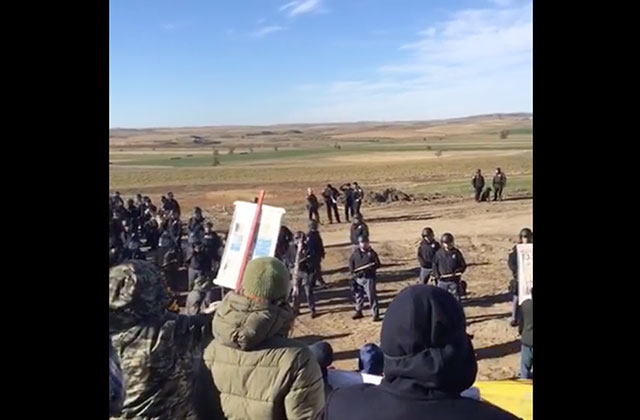In North Dakota, as the Standing Rock Sioux Tribe continues to stand up against the 1,172-mile long Dakota Access Pipeline, various legal setbacks occured this weekend.
The U.S. Court of Appeals denied the injunction the tribe requested on October 9 citing that the Sioux have “not met the narrow and stringent standard governing this extraordinary form of relief.” This injunction would have paused the pipeline’s construction while their case against the U.S. Army Corps of Engineers—who approved the permits—moves forward.
At this, Tribal Chairman Dave Archambault II said, in a statement sent to Colorlines:
“This ruling puts 17 million people who rely on the Missouri River at serious risk. And, already, the Dakota Access Pipeline has led to the desecration of our sacred sites when the company bulldozed over the burials of our Lakota and Dakota ancestors. This is not the end of this fight. We will continue to explore all lawful options to protect our people, our water, our land, and our sacred places.”
The Department of Justice, Department of the Army and Department of the Interior released a joint statement yesterday (October 10) after the appeals court handed down its decision. The statement read:
We appreciate the D.C. Circuit’s opinion.
We continue to respect the right to peaceful protest and expect people to obey the law.
The Army continues to review issues raised by the Standing Rock Sioux Tribe and other Tribal nations and their members and hopes to conclude its ongoing review soon. In the interim, the Army will not authorize constructing the Dakota Access Pipeline on Corps land bordering or under Lake Oahe. We repeat our request that the pipeline company voluntarily pause all construction activity within 20 miles east or west of Lake Oahe.
We also look forward to a serious discussion during a series of consultations, starting with a listening session in Phoenix on Tuesday, on whether there should be nationwide reform on the Tribal consultation process for these types of infrastructure projects.
That same day, Indigenous People’s Day or "Columbus Day," hundreds of people gathered at a worksite to pray. According to the alternative news site Unicorn Riot, which has been closely following the actions against the pipeline since April, “at least 100 sheriffs’ deputies and state troopers in riot gear, some with automatic weapons, descended on the DAPL site to move against water protectors.” Stutsman County armed vehicles were also on site.
{{image:2}}
Officers—Unicorn Riot identified some as federal agents, others as Morton County police and a number as sheriffs from other counties—ultimately arrested 27 people for “engaging in a riot, criminal trespass and reckless endangerment,” reported Unicorn Riot. Actress Shailene Woodley (“Snowden”), who has attended protests against the pipeline in the past, was one of those arrested. The arrest was captured on a Facebook live video she posted to her page at the two-hour mark.
Law enforcement also closed the road leading to the action to prevent more supporters from gathering, as shown in a Facebook Live video water protector Joseph White Eyes shared. An officer can be heard saying, “We’re not adding anymore people to the protest.”
The ACLU issued a statement yesterday on the police action. “The mobilization of military-style force against indigenous people in this country has a long and terrible history,” the statement explained. It goes on:
The Sacred Stone Camp and the water protectors are peaceful, nonviolent, and led and directed by indigenous people who for too long have experienced oppression by government agencies, both state and local. The time for demilitarization is now — before the heated rhetoric of the sheriff’s office and the on-going police presence create a situation that ends in violence.
Several other actors, including Rosario Dawson (“Luke Cage”), Leonardo DiCaprio (“The Revenant”) and Mark Ruffalo (“The Avengers”), condemned the actions on Twitter.
Protecting sacred land’s an honor/duty! Proud of @ShaileneWoodley for taking a stand! #NoDAPL #IndigenousPeoplesDay https://t.co/B7MAJPZTjG
— Rosario Dawson (@rosariodawson) October 10, 2016
I stand with @shailenewoodley for standing with the Standing Rock Water Protectors. #NoDAPL https://t.co/BqIbfApUCI
— Mark Ruffalo (@MarkRuffalo) October 10, 2016
Actions against the pipeline also continue in Iowa, where water protectors have camped out along the Mississippi River, which the pipeline is set to run below.
(H/t Unicorn Riot)
